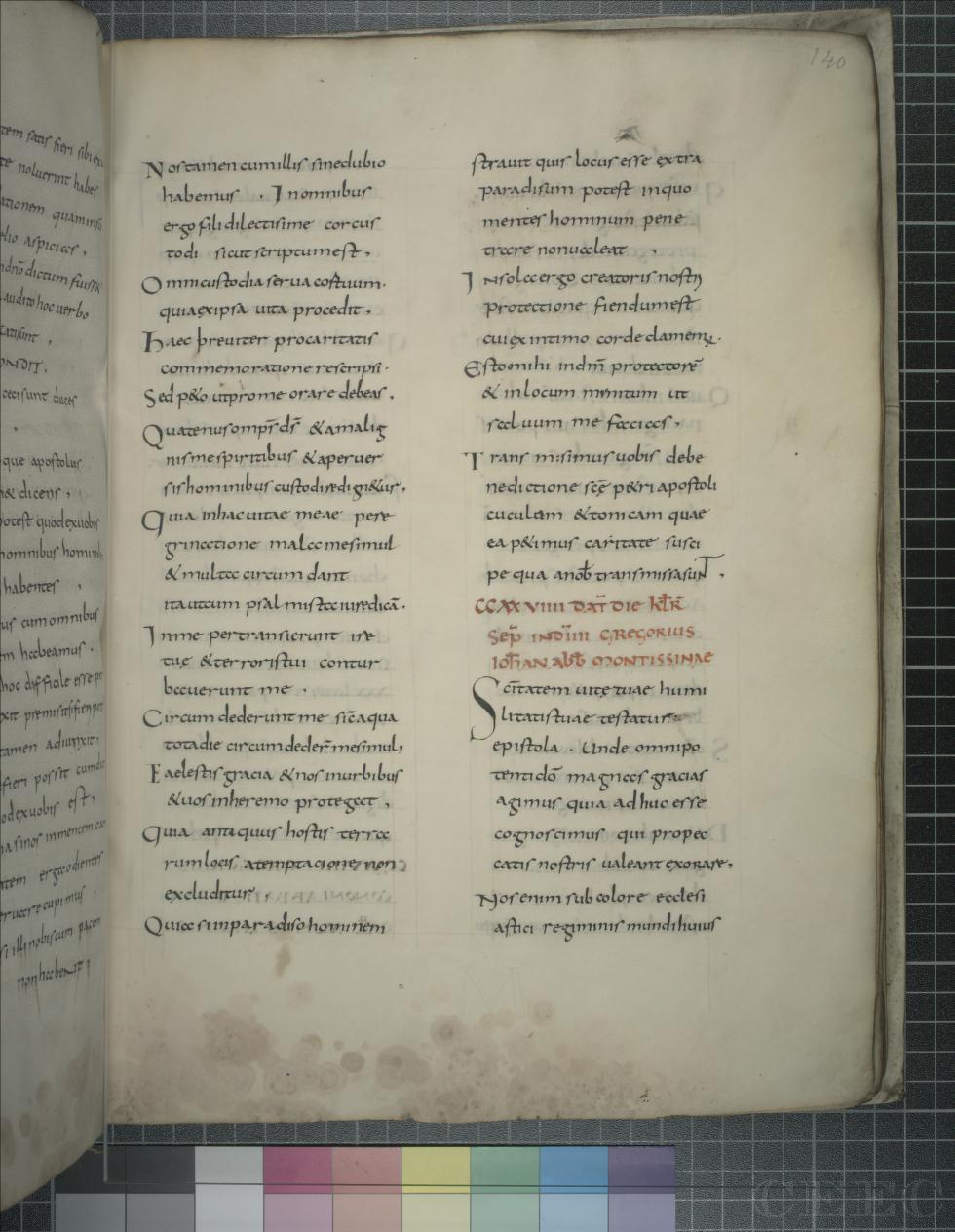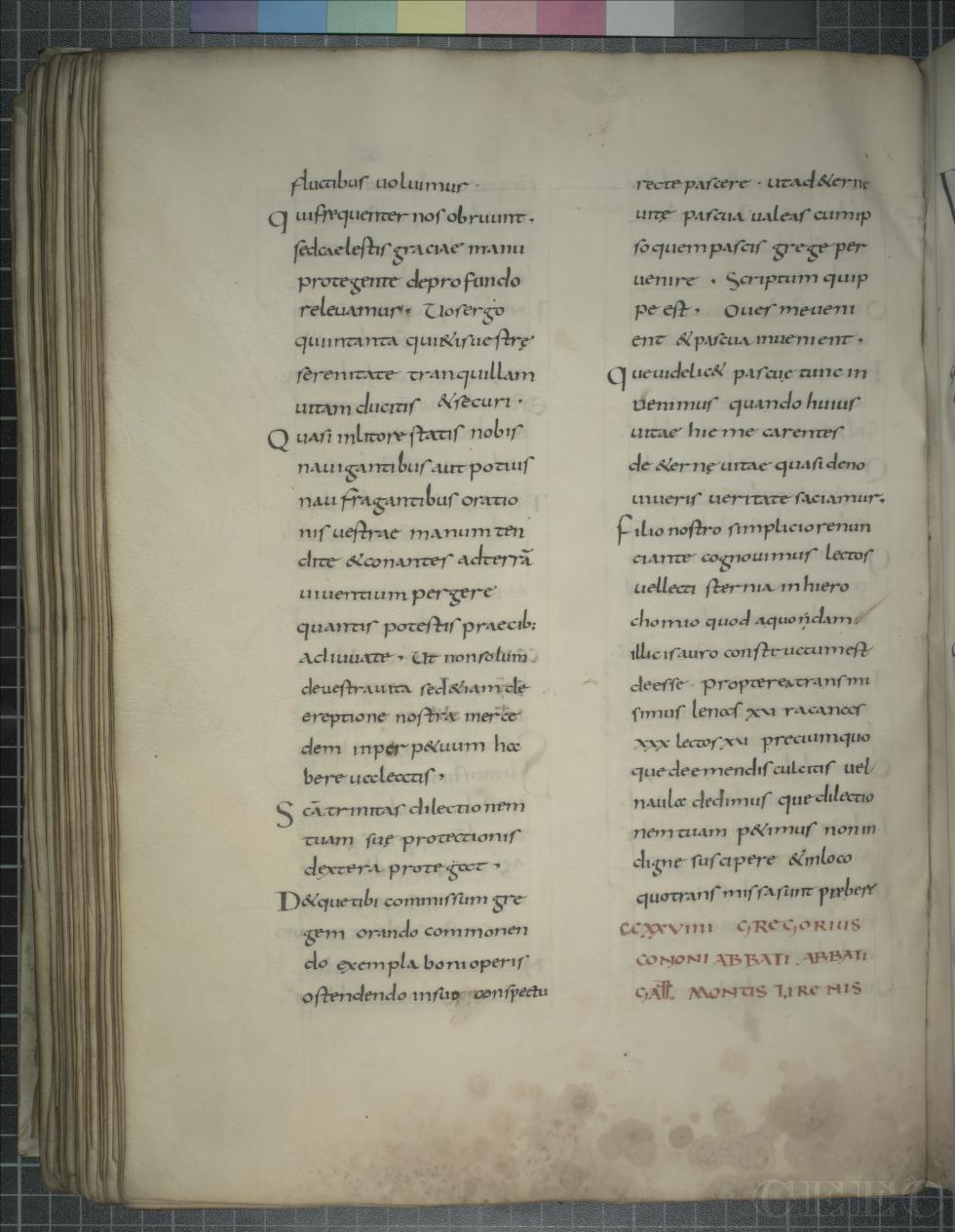St. Gregory's the Great Epistle
Book XI, Epistle I. Gregory to John, Abbot of Mount Sina123 (translation by Philip Schaff, 1819-1893 - from: https://www.ccel.org/ccel/schaff/npnf213.html ).
The Epistle of thy Humility testifies to the holiness of thy life; whence we give great thanks to Almighty God, for that we know that there are still some to pray for our sins. For we, under the colour of ecclesiastical government, are tossed in the billows of this world, which frequently overwhelm us. But by the protecting hand of heavenly grace we are raised up again from the deep. Do you, then, who lead a tranquil life in the so great serenity of your rest, and stand as it were safe on the shore, extend the hand of your prayer to us who are on our voyage, or rather who are suffering shipwreck, and with all the supplications in your power help us as we strive to reach the land of the living, so that not only for your own life, but also for our rescue, you may have reward for ever. May the Holy Trinity protect thy Love with the right hand of Its protection, and grant unto thee in Its sight, by praying, by admonishing, by shewing example of good work, to feed the flock committed to thee, that so thou mayest be able to reach the pastures of eternal life with the flock itself which thou feedest. For it is written, My sheep shall come and shall find pastures (John x. 27). And these pastures in truth we find, when, freed from the winter of this life, we are satisfied with the greenness of eternal life, as of a new Spring.
We have learnt from the report of our son Simplicius that there is a want of beds and bedding in the Gerontocomium124, which has been constructed by one Isaurus there. Wherefore we have sent 15 cloaks, 30 rachanæ125, and 15 beds. We have also given money for the purchase of mattresses and for their transport, which we beg thy Love not to disdain, but to supply them to the place for which they have been sent.
Given on the day of the Kalends of September, Indiction 4. [600 A.D].
123 No doubt the John called Climacus, Scholasticus, and Sinaita, commemorated as a saint on 30 March. Having entered the monastery of Mount Sinai at the age of 16, he is said to have retired thence to live the life of an anchoret, to have been elected abbot at the age of 75, to have again after a time retired into solitude, and to have died early in the 7th century. While abbot, he wrote a work called Scala (κλῖμαξ) Paradisi, whence his name of Climacus. The monastery on Mount Sinai was a place to which pilgrimages were made. Cf. IV. 46.
124 Properly a hospital for aged persons.
125 The meaning of the word rachana, racana, or racahina, is uncertain. It occurs again in XI. 78, where Barbara and Antonina, two young ladies at Constantinople, are thanked for a present of two racanæ, which they had alleged to be of their own workmanship. It is usually supposed to mean some wooller article of dress, worn by monks. Others understand blankets.
The original text (from Patrologiæ Latinæ of J.P.Migne, 1862, vol.77, 1117D-1119B & manuscript Cologne 92, 8th cent., f.140ab - www.ceec.uni-koeln.de).
Sanctitatem vitae tuae humilitatis tuae testatur epistola, unde omnipotenti Deo magnas gratias agimus, quia adhuc esse cognoscimus, qui prò peccatis nostris valeant exorare. Nos enim sub colore ecclesiastici regiminis, mundi hujus fluctibus volvimur , qui frequenter nos obruunt, sed coelestis gratiae manu protegente, de profundo re- levamur. Vos ergo, qui in tanta quietis vestrae serenitate tranquillam vitam ducitis, et securi quasi in littore statis, nobis navigantibus aut potius naufragantibus orationis vestrae manum tendite, et conantes ad terram viventium pergere, quantis potestis precibus adiuvate , ut non solum de vestra vita , sed etiam de ereptione nostra mercedem habere in perpetuum valeatis, Sancta Trinitas dilectionem tuam suae protectionis dextera protegat , detque tibi com- missum gregem orando , admonendo, exempla boni operis estendendo, in suo conspectu recte pascere, ut ad aeter- nae vitae pascua valeas cum ipso quem pascis grege per- venire. Scriptum quippe est : Oves meae venient et pascua invenient , quae videlicet pascua tunc invenimus, quando huius vitae hyeme carentes, de aeternae vitae quasi de novi veris viriditate satiamur.
Filio nostro Simplicio renunciante cognovimus, lectos vel lectisternia in gerontocomio, quod a quodam illic Isauro conditum est , deesse. Propterea misimus laenas XV, ra- chanas XXX , lectos XV , pretium quoque de emendis culcitris vel naula dedimus, quae dilectionem tuam peti— mus non indigne suscipere, sed in loco quo transmissa sunt, praebere. Data die kalend. septembr., indictione IV.
 manuscript Cologne 92 - f.140a
manuscript Cologne 92 - f.140a
 manuscript Cologne 92 - f.140b
manuscript Cologne 92 - f.140b




